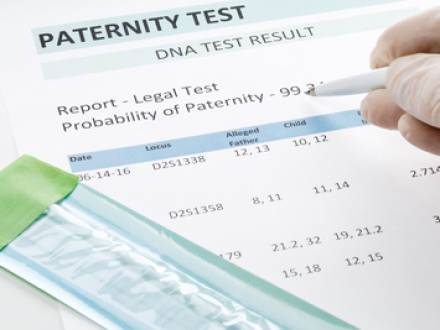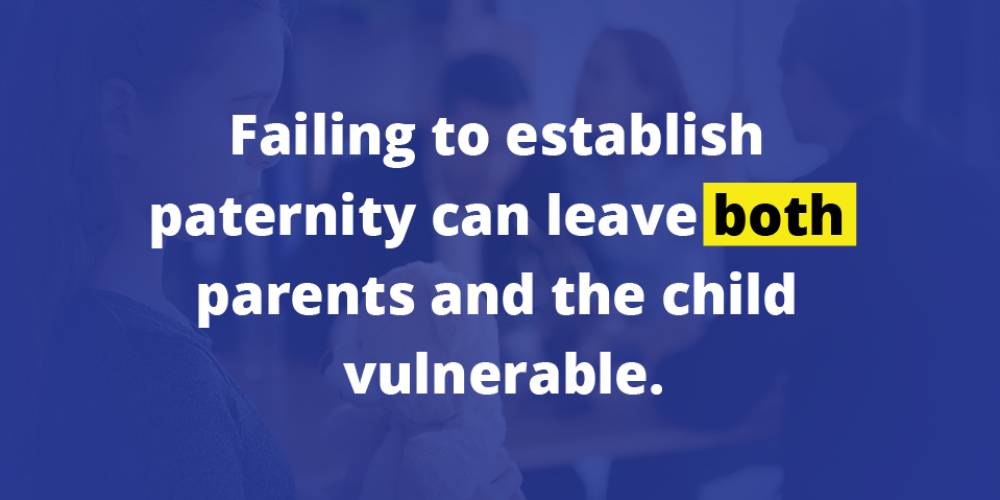5 Reasons to Establish Paternity in Illinois
 In Illinois, establishing paternity is not just a legal formality. It is a decision that can shape a child’s emotional, financial, and physical well-being for years to come. Whether you are a mother considering how to secure support for your baby, or a father seeking a relationship with your child, understanding why paternity matters is the first step.
In Illinois, establishing paternity is not just a legal formality. It is a decision that can shape a child’s emotional, financial, and physical well-being for years to come. Whether you are a mother considering how to secure support for your baby, or a father seeking a relationship with your child, understanding why paternity matters is the first step.
Illinois law provides clear paths to determine parentage and protect a child’s best interests. If you are going to be a mother or father and you are not sure whether you want to establish paternity for your child, consider the following information and then contact our Batavia, IL paternity lawyer.
Why Paternity Matters in Illinois
When a child is born to married parents, Illinois law automatically assumes the husband is the legal father. But when a child is born outside of marriage, paternity must be established for the father to have legal rights and responsibilities. This can be done voluntarily by signing a Voluntary Acknowledgment of Paternity or through a court proceeding if there is disagreement about parentage.
Failing to establish paternity can leave both parents and the child vulnerable. The mother may not be able to seek child support. The father may have no legal right to custody or visitation. And the child may miss out on vital benefits, from health insurance to knowing their medical history.
Paternity Gives Fathers Legal Rights
Without legal paternity, a biological father has no enforceable right to see his child, even if he has been involved in their life since birth. This means that if the mother chooses to cut off contact, the father has no standing in court to ask for visitation or custody.
For fathers who want to build and maintain a meaningful relationship, establishing paternity is the key. Once paternity is confirmed, fathers can petition for parenting time, decision-making responsibilities, and involvement in major choices about the child’s education, healthcare, and upbringing.
Consider this example: In Kane County, a man who had been actively involved in his son’s life since birth found himself suddenly excluded when the child’s mother moved in with a new partner. Because he had not established paternity, he could not legally demand visitation. After initiating a paternity case and proving he was the child’s father, the court granted him shared parenting time, allowing him to remain a central figure in his son’s life.
Paternity Helps Mothers Secure Support
For mothers, establishing paternity is essential for enforcing a father’s financial responsibilities. Illinois law requires both parents to contribute to the costs of raising a child, but without paternity, the state cannot order a father to pay child support.
This support can be critical for providing housing, food, clothing, and education. In cases where the father resists involvement, paternity establishment ensures that the mother does not bear the financial burden alone.
Knowing Their Father Sets Children Up for Success
For children, paternity brings both emotional and practical advantages. Beyond the financial support and access to the father’s health insurance or Social Security benefits, there is value in knowing both parents. Children often develop a stronger sense of identity and belonging when they understand where they come from and have the opportunity to form relationships with both sides of their family.
Here is another example: A Batavia teenager developed a rare genetic condition that required an extensive family medical history to diagnose properly. Because her father’s paternity had never been established, her doctors initially lacked access to vital information. Only after paternity testing and legal recognition of her father could they gather the needed medical records to tailor her treatment.
Paternity Gives Legal Protections to the Child
Establishing paternity grants a child inheritance rights under Illinois law. This means that if the father passes away, the child may be entitled to a share of his estate and can receive life insurance or wrongful death benefits. Without legal paternity, these protections may be unavailable.
Paternity Clarifies Parental Responsibilities
Finally, paternity protects both parents by clearly defining their rights and obligations. This reduces the likelihood of disputes over custody and support down the road. For fathers who worry about being shut out and for mothers who worry about being left unsupported, paternity offers legal certainty and a framework for co-parenting.

How to Establish Paternity in Illinois
Under 750 ILCS 46/301, there are three main ways to establish paternity in Illinois, each with its own process and timeline:
Voluntary Acknowledgment of Paternity (VAP)
-
This form can be signed at the hospital when the baby is born or later at the local county clerk’s office or Department of Healthcare and Family Services (HFS).
-
Both parents must sign the VAP in the presence of a witness. Once filed, the father’s name is added to the birth certificate.
-
A VAP has the same legal effect as a court order once 60 days have passed, unless one parent files a timely legal challenge for fraud, duress, or mistake of fact.
Administrative Paternity Order Through HFS
-
If parents do not agree on paternity, the mother may request assistance from HFS Child Support Services.
-
HFS can order genetic testing and issue an administrative paternity order if the test confirms the alleged father’s biological relationship.
-
The process can take several weeks to months, depending on the availability of both parents and the time required for DNA testing. Working with an attorney is usually much faster.
Judicial Establishment of Paternity
-
Either parent may file a petition in circuit court to establish paternity.
-
If paternity is contested, the court can order genetic testing.
-
After testing, the judge issues an order of parentage that legally establishes the father’s rights and obligations.
-
Court proceedings can take several months, especially if other issues like child support or parenting time are also being resolved.
It is important to act quickly because Illinois law generally allows paternity actions to be filed until the child’s 18th birthday, but some related claims (like retroactive child support) may be affected by delays.
Contact a Kane County, IL Parental Rights Attorney
Whether you are a mother or father, establishing paternity can protect your child’s future and strengthen family bonds. Speak with a Batavia, IL paternity lawyer at The Law Office of Matthew M. Williams, P.C. to learn more about your options. We can guide you through the process and help you make decisions that benefit your child. Call 630-409-8184 today to schedule a free consultation.

 630-409-8184
630-409-8184













